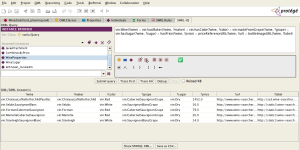SWRL-IQ
SWRL-IQ
SWRL-IQ (Semantic Web Rule Language Inference and Query tool) is a plugin for Protege 3.4.x that allows users to edit, save, and submit queries to an underlying inference engine based on XSB Prolog.
Versions & Compatibility
This section lists available versions of SWRL-IQ.
| Version | Compatible with | Dependencies |
|---|---|---|
| SWRL-IQ 1.1b | Protege 3.5 | XSB Prolog |
| SWRL-IQ 1.1 | Protege-OWL 3.4 | XSB Prolog |
| SWRL-IQ 1.0 | Protege-OWL 3.4 | XSB Prolog |
If you click on the button below to add a new version of SWRL-IQ, you will be asked to define a page title for the new version. Please adhere to the naming convention of SWRL-IQ X.X.X when you define the new page!
Changelog
| Version | Changes in this version |
|---|---|
| SWRL-IQ 1.1b | Now works with Protege 3.5 beta. |
| SWRL-IQ 1.1 | The Reload KB check box is gone. SWRL-IQ now reloads the KB only when needed, and only re-loads the changed bits of the KB, which is much faster. |
| SWRL-IQ 1.0 | Initial release |
Description
SWRL-IQ has a number of features that distinguishes it from other query and reasoning tools, such as the Protege SQWRLQueryTab supported by the Jess rule engine:
- Goal-oriented backward-chaining Prolog-style reasoning (as opposed to the forward-chaining paradigm used by Jess and the Protege SWRL Bridge framework).
- Constraint-solving based on CLP(R) (Constraint Logic Programming with Reals). This allows for more declarative and powerful rules and queries.
- Saving queries.
- Exporting query results in XML or CSV format.
- Tracing and debugging inference results.
- No dependency on proprietary or closed-source components. Uses XSB Prolog, which is freely available under the LGPL license.
SWRL-IQ also has powerful SWRL extensions and a Java procedural attachment mechanism, similar to what the Jess query tab supports.
Documentation
Acknowledgments
SWRL-IQ development was carried out at the SRI facilities in Menlo Park, CA and was funded by the U.S. Department of Defense, TRMC (Test Resource Management Center) T&E/S&T (Test and Evaluation/Science and Technology) Program under NST Test Technology Area prime contract N68936-07-C-0013. The authors are grateful for this support and would like to thank Gil Torres, NAVAIR, for his leadership of the Netcentric System Test (NST) technology area, to which the ANSC project belongs. We would also like to acknowledge ODUSD/R/RTPP (Training Transformation) for its sponsorship of the associated ONISTT project.
David Warren and Terrance Swift provided expert guidance and bug fixes for XSB Prolog, and Miguel Calejo did the same for InterProlog.